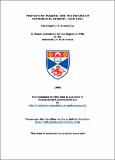Files in this item
Protestant polemic and the nature of evangelical dissent, 1538-1553
Item metadata
| dc.contributor.advisor | Pettegree, Andrew | |
| dc.contributor.author | Bradshaw, Christopher J. | |
| dc.coverage.spatial | 219 p. | en_US |
| dc.date.accessioned | 2015-08-03T14:41:06Z | |
| dc.date.available | 2015-08-03T14:41:06Z | |
| dc.date.issued | 1998 | |
| dc.identifier | uk.bl.ethos.575476 | |
| dc.identifier.uri | https://hdl.handle.net/10023/7106 | |
| dc.description.abstract | This study explores how Protestant writers during the period 1538-1553 dealt with the threats and opportunities that were offered to Protestant reform in England by the Royal Supremacy. Though initially propagandists for Henry VIII's new authority as Supreme Head of the English church, many polemicists were forced into religious and political marginalisation by the king's imposition of a theologically Catholic settlement of the English church in 1539. As a result during the later Henrician period, Protestant writers constructed an alternative ecclesiology for the Protestant community. This offered historical justifications for their own theological creeds. Just as importantly, this new ecclesiology legitimised the status of Protestant dissidents as a separate church from the king's official church. In addition Protestant writers constructed a biblical rhetoric within which they concealed and discussed the precise relationship of their theological creeds to the political authority that had rejected them. This ideology redefined both the nature of kingship and the king's religious role according to a series of biblical images. These images encapsulated and conveyed to the reader a series of associative ideas. The ideological assumptions behind these typological images were formative influences upon the nature of official religious reform during the Edwardian period (1547-53). The basis of this ideological sympathy was a close patron-client relationship between Edward's government and the Protestant writers. This allowed an iconoclastic destruction of traditional mediaeval religion but it also enabled the construction of a positive theological alternative to the Roman Catholic sacramental system. Protestant polemicists were at the centre of the formation of this new theological identity for the English church, and of the campaign which imposed it. However by the early 1550s the alliance of the governing elite and the Protestant polemicists began to break down. The means used to destroy the Catholic religious system had been acceptable to both oligarchy and Protestant writers, but it became obvious that their ends, unlike their means, did not agree. As a result the polemical heritage of criticism, that had been used against their Catholic opponents, was turned by Protestant writers against their ostensibly Protestant patrons. In the final part of the work the way that the polemicists' anti-government criticism influenced their providential explanations for the succession of Queen Mary is traced, and the greater significance of the polemical heritage of this period is assessed. | en_US |
| dc.language.iso | en | en_US |
| dc.publisher | University of St Andrews | |
| dc.subject.lcc | BR377.B8 | |
| dc.title | Protestant polemic and the nature of evangelical dissent, 1538-1553 | en_US |
| dc.type | Thesis | en_US |
| dc.type.qualificationlevel | Doctoral | en_US |
| dc.type.qualificationname | PhD Doctor of Philosophy | en_US |
| dc.publisher.institution | The University of St Andrews | en_US |
This item appears in the following Collection(s)
Items in the St Andrews Research Repository are protected by copyright, with all rights reserved, unless otherwise indicated.

